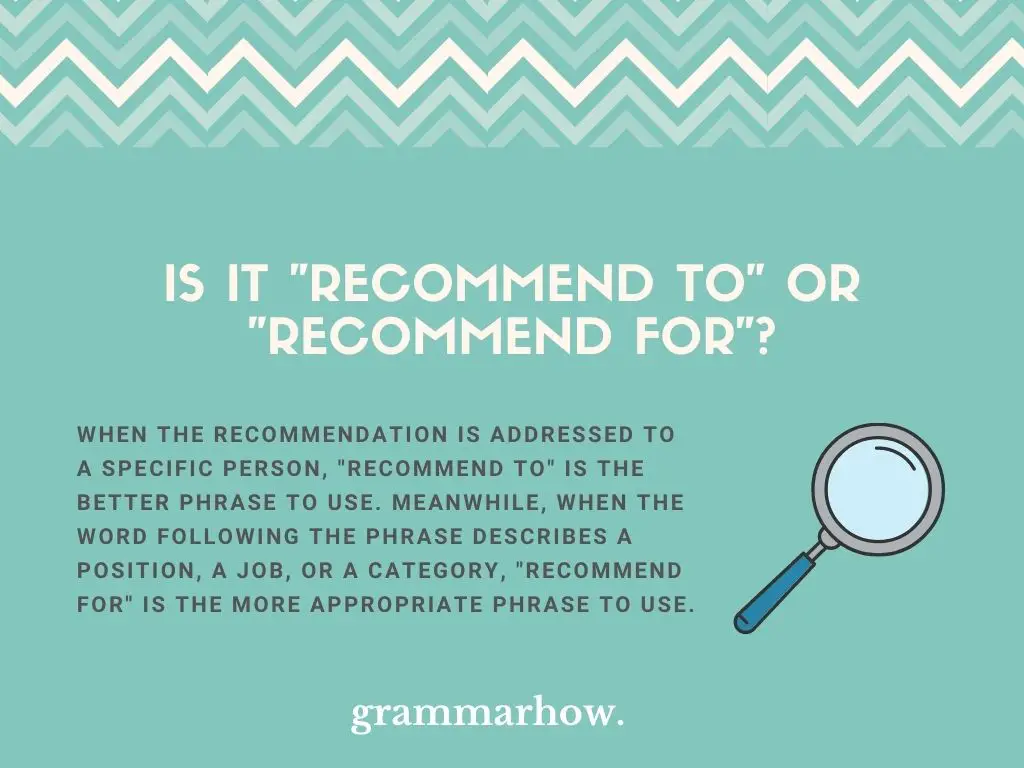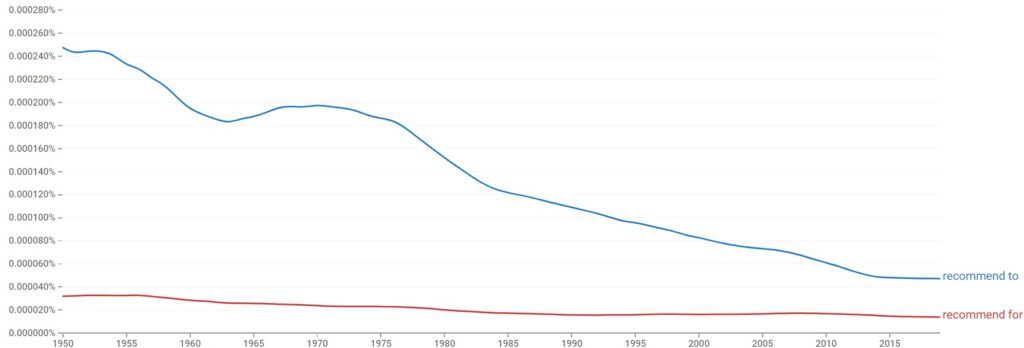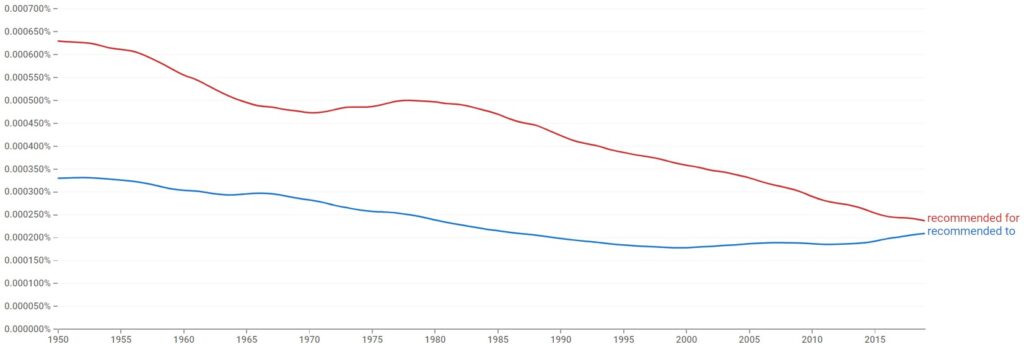Many English phrases are so similar that they are often confused for one another, or used interchangeably when they aren’t supposed to.
The phrases “recommend to” and “recommend for” are examples of this. This article will hopefully clear up any confusion you may have by explaining the difference between these two phrases.
Is It “Recommend To” or “Recommend For”?
When the recommendation is addressed to a specific person, “recommend to” is the better phrase to use. Meanwhile, when the word following the phrase describes a position, a job, or a category, “recommend for” is the more appropriate phrase to use.

The proper use of either phrase depends on the context in which it is used. There are certain cases in which these phrases can be correctly used interchangeably. However, it should be noted that this is not always the case.
The key difference between “recommend to” and “recommend for” is the preposition used after the word “recommend”.
Recommend To
“Recommend to” is the most appropriate phrase to use when the recommendation is addressed to a specific person. This specific person need not be named. It takes the form of nouns or pronouns, particularly the following: names, unnamed specific persons, definite pronouns, and indefinite pronouns.
The word “to” is a preposition that has many uses. In the Cambridge Dictionary, the definition that best fits its use in the phrase is the following: that it “is used after the verb, especially when the action in the infinitive will happen in the future”.
In the phrase “recommend to”, the verb is “recommend”. The word “to” is used to indicate the receiver of the action. “Recommend to” describes the recipient of the recommendation.
The receiver of the action must be specific. This includes nouns such as: names (“Jack”), unnamed specific persons (“doctor”, “friend”), definite pronouns (“you”, “him, “her”), and indefinite pronouns (“anyone”, “each one”).
Let’s take a look at this example:
- You did a great job, especially for an intern! You’re definitely the one I will recommend to the boss.
As you can see in this example, the word “to” indicates the receiver of the recommendation. In this case, it is “the boss”.
Here are other examples of how to correctly use “recommend to” in a sentence:
- Out of all the flavors we serve here, the mint and chip ice cream is the flavor I’d recommend to you.
- This breed of dog is the one I would recommend to Mary Angela.
- This is the highlighter I would recommend to my supervisor.
- I think the blanket with the butterflies is the one I recommend to you, it suits you the most!
- The executive assistant job is the one I recommend to you because you are willing to work even on weekends.
- This is the book that I, his adviser, will recommend to him.
- This is the meal that we recommend to most customers.
Recommend For
“Recommend for” is more often used in cases when the word following the phrase describes a position, a job, or a category (e.g. “those with diabetes”). Unlike in the phrase “recommend to”, the words following “recommend for” can either describe the recommendation itself or the recipient of the recommendation.
In this phrase, the word “for” is used as a preposition. The definition found in the Cambridge Dictionary that best fits the use of “for” in this phrase is the following: “in relation to something.”
The sentence below is essentially the same sentence we used in the previous section, but it has been modified to make “recommend for” the more appropriate phrase to use:
- You did a great job, especially for an intern! You’re definitely the one I will recommend for the job.
Here are other examples of how to use “recommend for” in a sentence:
- Carol Anne is the one I recommend for the executive assistant job because she is willing to work even on weekends.
- What would you recommend for patients with a history of heart disease and diabetes?
- Is Maria Elena the one you recommend for the promotion?
- I think the blanket with the butterflies is the one I recommend for those who are fans of insects.
- What meal do you recommend for vegans?
- Mrs. Polanski is the one I recommend for the role of Juliet.
- What kind of pet would you recommend for those with asthma?
Is “Recommend To” or “Recommend For” Used The Most?
According to Google Ngram Viewer, “recommend to” is more frequently used than “recommend for”.

Google Ngram Viewer can chart how often both phrases are used in a wide range of books. Data from books published between the years 1950-2019 indicate that the phrase “recommend to” has been used less and less over the past few decades.
On the other hand, the use of the phrase “recommend for”, has remained relatively steady during these years. However, data shows that the phrase “recommend to” has been more frequently used than “recommend for” from 1950 to 2019.
Can “Recommend” Be Used Without A Preposition?
Yes, the word “recommend” can be used on its own without a preposition.
The word “recommend”, as defined in the Cambridge Dictionary, means “to suggest that someone or something would be good for a particular job or purpose, or to suggest that a particular action should be done.”
Here are examples of the word “recommend” when used without either “to” or “for” right next to it:
- I’ll recommend your suggestion to Mara
- This coffee is so good; I definitely recommend it to you.
- Hannah said she gave you her report the other day. Would you recommend her report to me?
- I recommend that we stop talking about this matter entirely, it will only upset both of us.
- Do you recommend that I see this movie alone?
Is It “Recommended To” or “Recommended For”?
“Recommended to” is the more appropriate phrase to use when the recommendation is addressed to a specific person, while “recommended for” is the more appropriate phrase to use when the word following the phrase describes a position, a job, or a category,
Take this sentence, for example:
- This book is one I recommended to you because I know you enjoy fantasy novels.
In the above example, “recommended to” is the appropriate phrase because the recommendation is addressed to a specific person (“you”).
Contrast this with the sentence below:
- This book is one I recommended for those who enjoy fantasy novels.
Here, the recommendation is no longer addressed to a specific person, but to “those who enjoy fantasy novels”.
According to data from Google Ngram Viewer, the phrase “recommended for” is more frequently used than “recommended to”. The use of both phrases, however, has declined since 1950. This is based on data from books published between the years 1950-2019.

You may also like:
“Recommend Me” vs. “Recommend To Me”: 9 Helpful Examples
Recommendation Of/For/To/On – Correct Preposition (Examples)
